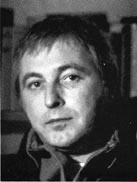|
|
|
| |
WRITER
AND EDITOR |
| |
I
met Orton in the foyer of the theatre. I hadn't known
quite what to expect - certainly not the casually dressed,
deceptively boyish figure who greeted me. I rather suspect
that I too came as a surprise. I had an impression that
he expected The Stage to be represented by a fuddy-duddy
- and not by a perky twenty-one year old dressed in a
serge sailor suit and clutching a large sketchbook rather
than a shorthand pad.
We talked about education; Orton telling me that he'd
learned little at his council school and was basically
self-taught. His conversation showed him to be of catholic
literary tastes; he talked of the classics, Sophocles,
Waugh and Firbank. History he spoke of as "comforting"
and added to this by saying that if one has a knowledge
of history then the irresponsible actions of men today
do not seem quite so frightening, as men have been indulging
in them for centuries. This didn't mean he was a "political
animal", he explained. "I'm neither fascist
nor right," he pointed out when I asked him whether
his plays held any message. "Any message in the plays
happens as part of the play and characters and is not
put in deliberately."
One point Orton asked me especially to make was that his
plays seemed to have been disliked by left-wing intellectuals
- those who spoke (in those days) of bringing culture
to the working classes - and yet his were exactly the
kind of plays they would enjoy. He was certainly not immodest
when he added that his plays "would give them entertainment
and culture".
On the subject of writing, Orton felt that too many of
the then current crop of new dramatists became obsessed
by dialogue: "This works against the play."
It was almost Rattiganesque to hear one of the 'new' dramatists
expressing such concern about plot - a remark he qualified
by saying that he enjoyed writing dialogue but found that
it could go on and on without a plot and sub-plot and
ultimately lead nowhere. "A plot gives you something
to fall back upon and given rise to lines itself,"
he told me.
I remember asking if he had any desire to write novels,
and Orton continued along the same track he'd already
been pursuing by saying that any novels he wrote would
be in dialogue form and that they would really be envisaged
for the stage. Therefore, he concluded, he would continue
to write plays.
We discussed Pinter and Orton remarked that the sexual
situation in the second act of The Homecoming obviously
shocked the majority of the play's audience. "But
I feel that audiences must be shocked," he continued,
"to rally them out of their basic lethargy. The only
field still heavily unexplored which will shock is the
sexual one."
We'd talked about future projects and Orton confided that
he had an idea for a prison play - "though it won't
be until the play after the next play - or maybe later."
Discussion of the prison play provoked me to ask about
the prison sentence imposed after he had been found guilty
of defacing library books. "I wouldn't have missed
it," he told me. "It was an experience. And
no one should be that sensitive that they couldn't stick
a short term 'inside'."
So often I've found that the most fascinating part of
an interview comes after the subject has muttered those
important words: "This is off the record." We'd
been discussing the original production of Loot and Orton
had pointed out that the version due to open a few days
later was the play as he'd written it. Material which
had been written into the touring production had been
removed, the lines cut at the Lord Chamberlain's request
had been restored.
Then Orton said the magic words: "This is strictly
off the record" and proceeded to tell me about the
traumas surrounding that first production of Loot. Of
course, this all happened nearly twenty years ago - and
the sketchbook containing my notes has long since disappeared
- but I do distinctly remember him telling me that the
play had almost been destroyed by Kenneth Williams' performance.
"He became more outrageous every night," he
told me.
Meeting people one admires can often be disappointing,
all too frequently they don't live up to the image that
one has created of them. Orton was one of the rare exceptions.
As an interviewer, I was inexperienced - but he didn't
seem to mind. He was charming, funny - most of all, he
was friendly.
|
|
|
